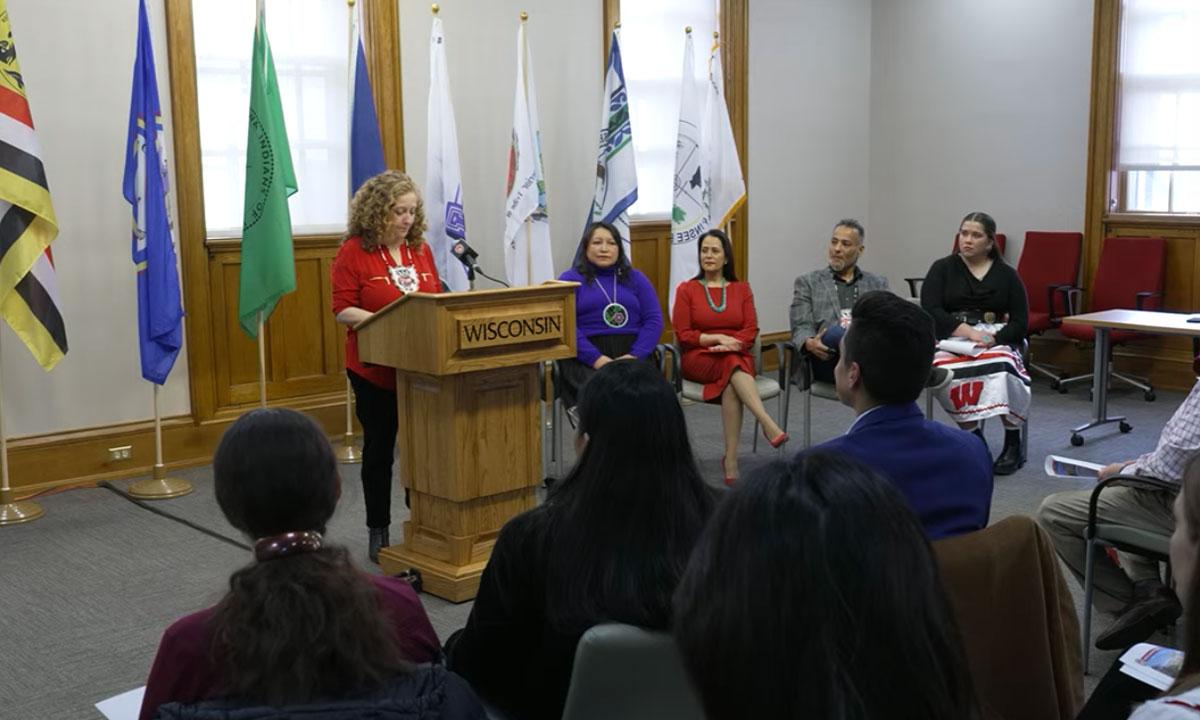UW-Madison Announces Program to Cover All Costs for Native American Students
There are about 650 students at UW-Madison who self-identify as Native American.

Get stories like this delivered straight to your inbox. Sign up for The 74 Newsletter
The University of Wisconsin-Madison announced a program on Monday that would cover all of the costs for students who are members of one of Wisconsin’s 11 federally recognized Native American tribes.
Any enrolled member of one of the tribes will be eligible for the program and eligibility will not depend on a student’s financial need. The program was announced less than a week after the UW System Board of Regents voted to approve a deal with the Republican-controlled state Legislature to freeze hiring for positions focused on diversity, equity and inclusion in exchange for the release of pay raises for thousands of UW employees and funds for capital projects — including a new engineering building on UW-Madison’s campus.
UW-Madison Chancellor Jennifer Mnookin, who supported the deal with the Legislature, said the program for Native American students has been in the works for more than a year so its announcement is not related but added that it shows the university remains committed to diversity.
“I have said and will continue to say that diversity is a core value for us as an institution here at UW Madison,” Mnookin said at a press conference announcing the program. “And this program is another example of the ways that that is and will continue to be true.”
The undergraduate program will cover the full costs of getting a degree at UW-Madison, including tuition and fees, housing, meals, books and other educational expenses. A separate five-year pilot program will cover in-state tuition and fees for students in the medical and law schools. The annual in-state cost for an undergraduate student is $28,916, according to the university. The cost of tuition and fees for law students is $35,197 annually and $42,198 annually for medical students.
Students will not need to apply for funding under the program. At the press conference Monday, university officials said students would just need to provide proof of tribal membership when they submit their annual financial aid forms.
Officials said there are about 650 students at UW-Madison who self-identify as Native American, however that self-identification doesn’t require proof of tribal affiliation and includes Native students from tribes outside of Wisconsin.
Mnookin said the program will be funded with money from private donations and “other institutional resources.” She wouldn’t say where specifically the other resources are coming from, but noted that none of the money will come from state funding.
The chancellor added that creating the program “felt like the right thing to do” to continue improving the partnership between the university — which sits on traditional Ho-Chunk Nation land — and the state’s 11 tribes.
“The tribal nations of Wisconsin, dating from the 1700s and into the 21st century, have always believed education to be the equalizer,” Shannon Holsey, president of the Stockbridge-Munsee band of Mohican Indians, said. “The truth is, if it were not for the loss of land by indigenous peoples, American colleges and universities would not exist. Institutions must challenge themselves to move away from encouraging acts that are performative into communities of transformative change. I believe today represents just that, the creation of this program marks a significant step in the partnership between American Indian tribes in Wisconsin and the University of Wisconsin-Madison. While several other states have programs with similar goals, we are not aware of any other effort that goes this far beyond financially helping Native students afford higher education.”
Officials said they don’t yet know how popular the program will be, noting that the application deadline for incoming students for the fall of 2024, when the programs will begin, is Feb. 1. Mnookin said it would be unrealistic to expect a large increase in Native American applicants within six weeks of announcing the program, but that she hopes the number of tribal members at UW-Madison will continue to increase once the program is more established.
Wisconsin Examiner is part of States Newsroom, a network of news bureaus supported by grants and a coalition of donors as a 501c(3) public charity. Wisconsin Examiner maintains editorial independence. Contact Editor Ruth Conniff for questions: info@wisconsinexaminer.com. Follow Wisconsin Examiner on Facebook and Twitter.
Get stories like these delivered straight to your inbox. Sign up for The 74 Newsletter

;)